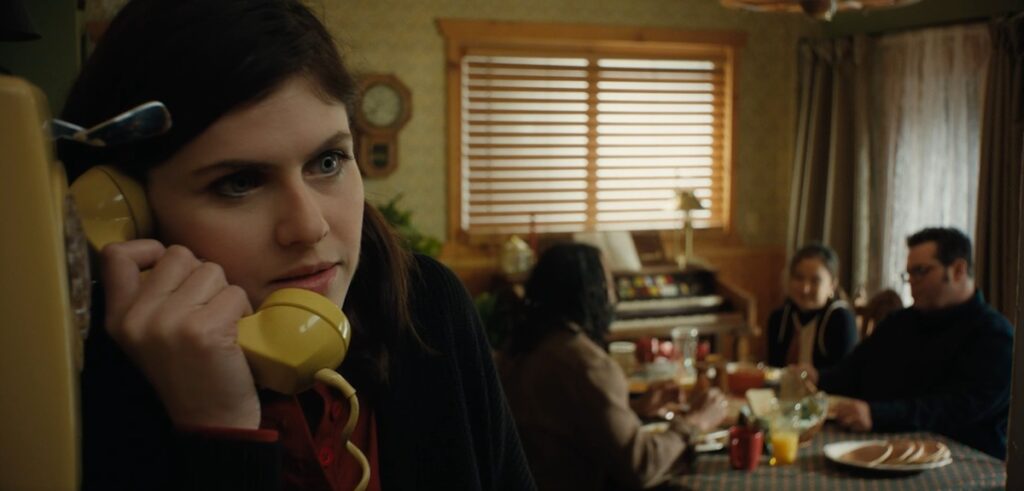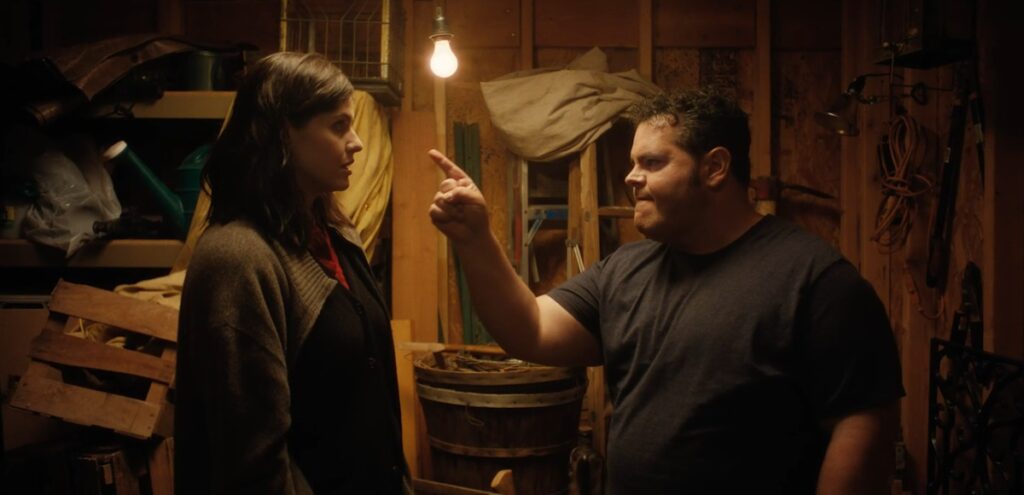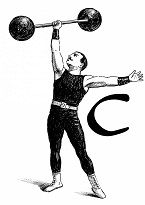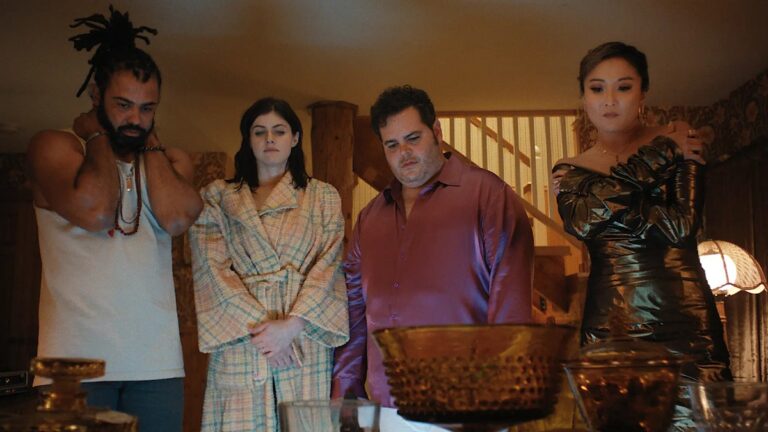By now, the image of a couple—or two—retreating into the wilderness for a therapeutic weekend has gone from serious indie drama territory to outright parody. Whether in horror, relationship comedy, or slow-burn drama, the cabin-in-the-woods setup carries its own baggage. So when Nora Kirkpatrick’s debut feature opens with two smiling couples heading to a cozy snow-covered cabin, we know something’s going to snap. The question is no longer if, but how. And with “A Tree Fell in the Woods,” the ‘how’ is messier than it is satisfying.
There’s an initial sense that Kirkpatrick knows what kind of film she wants to make—something stylish, knotty, vaguely surreal, and emotionally raw. But knowing what to do and knowing what to say are different things. Instead of turning the pressure cooker of a remote mountain home into a crucible for character unraveling, the film drifts through a series of scattered moments. It observes from a distance rather than pulling us into its characters’ inner lives. Ultimately, it plays like a mosaic of ideas, some stronger than others, none allowed to fully breathe.

Another Retreat, Another Breakdown
We begin on the road. Mitch (Josh Gad) and Melanie (Ashley Park) are en route to a vacation cabin, snow crunching under tires and conversation gliding over simmering tension. She jokes that his forgetting to bring turmeric is grounds for divorce. It’s a throwaway line, played for laughs, but Kirkpatrick lets the moment linger just long enough to suggest that the rot might already be setting in. At the cabin, they’re greeted by another couple: Debs (Alexandra Daddario) and Josh (Daveed Diggs). Debs and Mitch are longtime best friends; their ease with one another is instant and undeniable, which becomes one of the film’s more believable throughlines.
Initially, the mood is light, if a bit forced. There’s awkward small talk, snowy strolls, and red wine preempted by cliched speeches. But then a tree falls—a literal one—and things come crashing down with it. On a walk through the woods, Mitch and Debs narrowly avoid being crushed. When they return to the cabin, they spot something they weren’t supposed to: Melanie and Josh in the throes of betrayal, clearly visible through the open window.
What follows is a half-panicked debate between the jilted pair. Debs wants to confront them. Mitch—perhaps fearing what loneliness looks like for someone like him—talks her down. His reasoning is both comical and pathetic: she may look like Alexandra Daddario, but single life post-divorce is brutal no matter how you slice it.
[More Tribeca 2025 Coverage: ‘Cuerpo Celeste’: A Solar Eclipse Over Grief and Growing Up]
One Tree, Two Couples, Four Problems
Before long, a snowstorm traps the four of them inside with nowhere to hide, and the film shifts into confession-booze-and-bitterness mode. Ancient moonshine from the cellar enters the picture—magical realism adjacent, but more quirky than profound. Secrets tumble out, facades crumble, and the house becomes less a refuge and more a stage for passive aggression and emotional purging. There’s potential here, and Kirkpatrick toys with it, but never quite commits to the fallout.
That’s the frustrating part. “A Tree Fell in the Woods” begins with a compelling premise—two betrayed partners bottling up their anger in close quarters—but it doesn’t stick with that idea long enough to let it combust. The betrayal is revealed too early, and once it’s out in the open, the narrative fumbles its own tension. Each time a new angle or conflict is introduced, the movie veers sideways instead of pushing through. It’s as if it keeps teeing up catharsis and then backing away.
The remote setting, which could’ve been used to amplify pressure, ends up softening it. Being snowed in becomes a plot convenience rather than a source of claustrophobia. Characters talk, shift alliances, open up—sometimes sincerely, sometimes while high on fermented mystery liquor—but the momentum rarely builds. Kirkpatrick’s screenplay has flashes of wit, and her direction suggests promise. Still, the pieces don’t quite fit. There’s too much drifting and not enough gravity.

A Tree Fell in the Woods, but the Sound Isn’t Loud Enough
What helps the film stay afloat is its cast. Gad and Daddario, as childhood besties with a buried undercurrent of unresolved something, bring a lived-in rapport that’s surprisingly tender. Park, too, finds notes of regret and guilt beneath Melanie’s performative calm. Diggs is fine, though less distinct, his chemistry with Daddario never quite convincing us they’re a couple worth saving—or even breaking up. Across the board, the actors give more than the material ultimately earns.
Composer Mitchell Yoshida’s score bounces between sincerity and whimsy, which matches the film’s tonal restlessness. It works, mostly, even if it accentuates how uncertain the movie is about what it wants to be. Comedy? Introspective drama? Surreal character study? The answer shifts from scene to scene.
In the end, “A Tree Fell in the Woods” has enough interesting components to make you wish it were better. There’s an appetite here for honesty and discomfort, for strange tonal balances and messy emotional truths. But the follow-through isn’t there. For a film about coming clean, it never quite gets to the heart of the matter. Like a tree crashing in the distance, it makes a sound—but we’re not always sure what to make of it.

Nora Kirkpatrick’s “A Tree Fell in the Woods” had its world premiere last June 8, 2025, at this year’s Tribeca Festival. The film festival runs from June 4 to 15, 2025. Follow us for more coverage.


